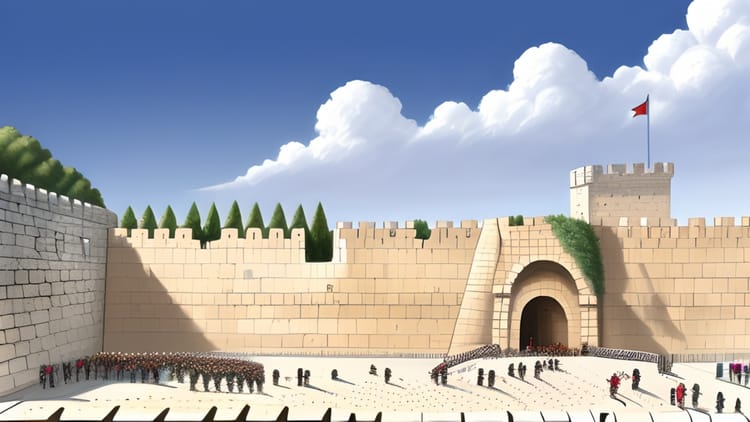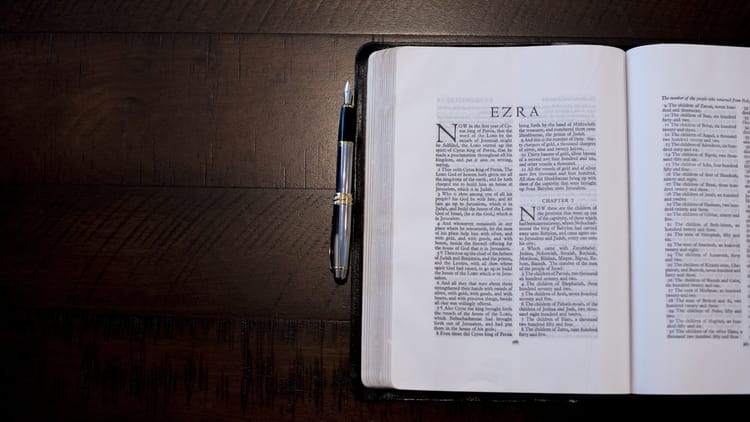God’s Role and Ours (Ezra 7-8)

We've been looking at the book of Ezra for the past few weeks. Ezra is all about restoration. When Judah was in exile in Babylon, 400 miles away from home, and Jerusalem was completely destroyed, God graciously restored his people. We've been looking at how this happened in unexpected ways as they faced all kinds of obstacles.
This isn't just a story about what God did long ago and far away. It was written later to encourage God's people later that God still watches over and restores his people, even when things hopeless.
Today we're in chapters 7 and 8 of Ezra, and for the first time we meet Ezra, the person this book is named after. By the time we meet Ezra in Ezra 7:1, 80 years have passed since the start of the book. The Temple has been rebuilt under a man named Zerubbabel, who then just disappears from the book. Then we meet Ezra. Ezra's genealogy in verses 1-5 shows that he comes from a priestly family and is a descendant of the high priest before the Babylonian captivity.
Then we read a little bit about Ezra's return to Jerusalem, as well as what he was like, in verses 8 to 11:
Ezra arrived in Jerusalem in the fifth month of the seventh year of the king. He had begun his journey from Babylon on the first day of the first month, and he arrived in Jerusalem on the first day of the fifth month, for the gracious hand of his God was on him. For Ezra had devoted himself to the study and observance of the Law of the Lord, and to teaching its decrees and laws in Israel.
This is a copy of the letter King Artaxerxes had given to Ezra the priest, a teacher of the Law, a man learned in matters concerning the commands and decrees of the Lord for Israel…
So here's what we know: Ezra was a priest. He had "devoted himself to the study and observance of the Law of the Lord, and to teaching its decrees and laws in Israel." And he was a man "learned in matters concerning the commands and decrees of the Lord for Israel…"
And he was evidently highly regarded, enough that the king at the time essentially wrote him a blank check in the rest of chapter 7. He may have held a high position in the royal court of King Artaxerxes. He received immense power. "And anything else needed for the temple of your God that you are responsible to supply," the king wrote in verse 20, "you may provide from the royal treasury." And in verse 26: "Whoever does not obey the law of your God and the law of the king must surely be punished by death, banishment, confiscation of property, or imprisonment." Ezra was obviously given extraordinary power.
Ezra's influence was huge. Under his leadership, we read in chapter 8 that many people returned. Estimates put the number at 5,000. He seems to have played a big role in organizing the affairs of the nation as they returned. Some fourteen years later, Ezra led in a service of dedication of the wall in Jerusalem in Nehemiah's time, and the service led to a great religious awakening – what we would call a revival today.
Some people believe that Ezra had another role. He may have compiled parts of what we now call the Hebrew Bible. He may have also written this book, the Book of Ezra, as well as 1 Chronicles. He was so highly regarded later on that some said that if Moses had never existed, then God would have given his law to Ezra instead.
One of the most striking things about Ezra in chapters 7 and 8 is a decision that Ezra made. Ezra returned to Jerusalem with millions of dollars of gold and silver. They were traveling 400 miles, a journey that would take them four months. They would be easy targets. When Nehemiah made this trip a few years later, he made it under armed escort. But listen to how Ezra handled the challenge of making this trip with millions of dollars worth of valuables. It's found in Ezra 8:21-23:
There, by the Ahava Canal, I proclaimed a fast, so that we might humble ourselves before our God and ask him for a safe journey for us and our children, with all our possessions. I was ashamed to ask the king for soldiers and horsemen to protect us from enemies on the road, because we had told the king, "The gracious hand of our God is on everyone who looks to him, but his great anger is against all who forsake him." So we fasted and petitioned our God about this, and he answered our prayer.
It's hard not to like this guy. He was powerful. He was righteous. He was honest and trustworthy. He depended on God even when it was risky, even when it would have made sense to do otherwise. He had a lasting influence on God's people, and we're still talking about him even today.
But do you also feel a bit of a tension? It's a tension that kind of lies under the surface as you read these chapters, but it really came to the fore as I read about Ezra's decision to travel without an escort.
On one hand, I want to get up here and preach a sermon on how we can have influence like Ezra. It would preach, too! I could talk about the importance of gaining positions of influence in government, business, and the arts so that you are in a position of power. I could preach on being a person of trust, so that others feel like they can write you a blank check which you can then invest for kingdom purposes because you are a trustworthy person. I could talk about being a person of the Word of God, as Ezra was. I could even talk about trusting God and not relying on human protection because you are instead relying on God. All of that would preach!
But the problem with this is that it puts the emphasis in the wrong place. It makes Ezra the hero of the text, and I'm not so sure if that's why Ezra was written. "Look at me! This is how you should be too." Somebody's said:
God is the hero of every text. This does not mean that biblical characters have no exemplary qualities for us to emulate, but we must understand that when these positive qualities appear — in their lives or ours — grace is the cause… The first thing to notice about biblical characters is that they are incorporated into the biblical text not for their own sake but to show what God is doing through, in and for them—to show how God advances his kingdom through the efforts of human beings and sometimes in spite of them. (Bryan Chapell)
You see, the Bible almost goes out of its way to encourage us not to treat its characters as heroes. Almost every character is presented as flawed and unable to do what needs to be done on their own. Do you ever read the Bible and shake your head at how badly the main characters behave? They mess up at every turn. The point of the Bible can't be to imitate all of their good qualities. One preacher puts it his way:
[Some people say] "Look at these people! Look at what they're doing! These are supposed to be moral exemplars, aren't they? What kind of people are these? I don't want to read about this!"
If you ever feel that way about reading the Bible, it shows that you don't understand the message of the Bible. You're imposing your understanding of the message on the Bible. You're assuming that the message of the Bible is "God blesses and saves those who live morally exemplary lives." That's not the message of the Bible. The message of the Bible is that God persistently and continuously gives his grace to people who don't ask for it, don't deserve it, and don't even fully appreciate it after they get it. (Tim Keller)
By the way, this isn't just an academic debate. It's important. We'll read the Bible completely differently if we read it like Aesop's fables, teaching us moral lessons, compared to if we see it as a book about God saving and using people who couldn't save themselves. Those are two completely different messages. One will crush and defeat us; the other will save us.
So I don't want to preach the message I could preach today and tell you all the ways that you can be like Ezra. I want to draw our attention instead to two themes. If you get only one theme, then you'll completely miss the point of not only this passage, but of all of Scripture. The first theme is this:
It's all about God's grace
Note with me whose fingerprints are all over this passage. It's God. Ezra 7:6 says, "The hand of the LORD his God was on him." Verse 8: "The gracious hand of his God was on him." Verses 27 and 28:
Praise be to the Lord, the God of our ancestors, who has put it into the king's heart to bring honor to the house of the Lord in Jerusalem in this way and who has extended his good favor to me before the king and his advisers and all the king's powerful officials. Because the hand of the Lord my God was on me, I took courage and gathered leaders from Israel to go up with me.
Chapter 8:18: "Because the gracious hand of our God was on us…" Verse 23: "So we fasted and petitioned our God about this, and he answered our prayer." Verse 31: "The hand of our God was on us, and he protected us from enemies and bandits along the way."
God's fingerprints are everywhere. You could say that the theme of these two chapters is, "The gracious hand of God was on us." It's a phrase that continues in the next book, Nehemiah, about God's gracious blessing at strategic points in Ezra's life and over all the people.
This reminds us of the true hero of this text: it's all about God. It also reminds us of an important Biblical principle that continues even today: the sovereignty of God and our inability to save ourselves. It's all about God and his saving acts.
What difference does this make? It makes all the difference in the world. Larry Crabb puts it this way in a book called The Pressure's Off: There's a New Way to Live.
Right now, at this very moment, you're walking one of two paths through life.
Either you've decided that what you most want out of life is within your reach, and you're doing whatever it takes to get it
or
you've realized that what you most want is beyond your reach, and you're trusting God for the satisfaction you want. You want Him. Nothing less, not even His blessings, will do.
If you're walking the first path, your life is filled with pressure. Inside, where no one sees, your soul is weary. You see no way to step off the treadmill. Or life is going well, and you're satisfied. But you sense something's wrong, something's missing. The pressure's still there.
If you're walking the second path [trusting God], you have hope. Your soul may be weary, your interior world may be filled with struggles no one sees, but you have hope. At times you rest. Something alive is within you; the desire of your heart is not smothered. You can taste freedom. And the taste brings joy.
Most people – even most Christians, he says – are living the old way. They're relying on themselves to make life work.
But there's another way to live, and it's the way of grace. It's believing that God has graciously provided everything that we need, and that he is the one who does anything that's good. Our job is to learn complete dependence on him.
The evangelist Luis Palau describes how this became real to him:
During my first semester at Multnomah School of the Bible, Torchbearers founder Major Ian Thomas spoke at our chapel service. He talked about how it took Moses 40 years in the wilderness to learn that he was nothing. Then one day Moses was confronted with a burning bush—likely a dry bunch of ugly sticks—yet Moses had to take off his sandals. Why? Because God was in the bush!
Major Thomas said, "God was telling Moses, 'I don't need a pretty bush or an educated bush or an eloquent bush. Any old bush will do as long as I'm in the bush. If I'm going to use you, it won't be you doing something for me, but me doing something through you.'"
I was that kind of bush: a useless bunch of dried up sticks. I could do nothing for God. All my reading and studying and modeling myself after others was worthless unless God was in the bush. Only he could make something happen.
When Thomas closed his message, I ran back to my room and in tears prayed in my native Spanish. My spiritual struggle was finally over! I'd let God be God and let Luis be dependent on him.
The most powerful people in this world are the ones who, like Ezra, see God's hand in everything. They have come to understand the gospel, which is that God has provided for us what we couldn't provide for ourselves. We're right with God not because of what we have done but because of what Jesus has done for us.
The most powerful churches are those that understand the power doesn't lie with us, but with God. We can do all things through Christ. Without Christ, we are nothing. It's all grace. We can't take any credit.
But as we leave this morning, I need to give you the second theme, the flip side. It's this:
God's grace and human effort go hand in hand
Do you notice in this passage that relying on God's grace didn't make Ezra passive? Ezra was completely dependent on God, but he dependence and passivity are not the same thing. He recruited, he organized, he led. It's all up to God, but God has chosen to operate through human channels – people like Ezra, people like us.
This is the theme of the Bible: that God moves to save us when we were completely without hope, when we couldn't save ourselves, when we had absolutely nothing to offer. Salvation often comes from God. But God chooses to work through people. Even when God moved to deliver us from our sins, he did it by sending his Son as a human. God loves to work through people. Or, as someone put it, "God's grace wears a human face."
One of the biggest mistakes we could ever make is trusting in human strength. It's never enough. We don't have hope unless that hope is found in God. We should never trust in human strength in our lives, our families, and our churches.
But an equally big mistake is to forget that God operates in his strength through human channels and resources, not despite them and not in contrast to them. God chooses to work through people just like you, just like me. Not because of our strength; simply because of sheer grace. "But we have this treasure in jars of clay," Paul said, "to show that this all-surpassing power is from God and not from us" (2 Corinthians 4:7).
Father, thank you for the gospel. Thank you that we've been saved and that "it is by grace you have been saved, through faith—and this is not from yourselves, it is the gift of God— not by works, so that no one can boast."
But thank you as well that "we are God's handiwork, created in Christ Jesus to do good works, which God prepared in advance for us to do." Thank you that you use people like us, even though we're weak, to get your work done.
Now may we find our strength not in ourselves but in you. And may we in our lives and in our church show that the all-surpassing power of the gospel is all from God and not from us. In his name we pray, Amen.





